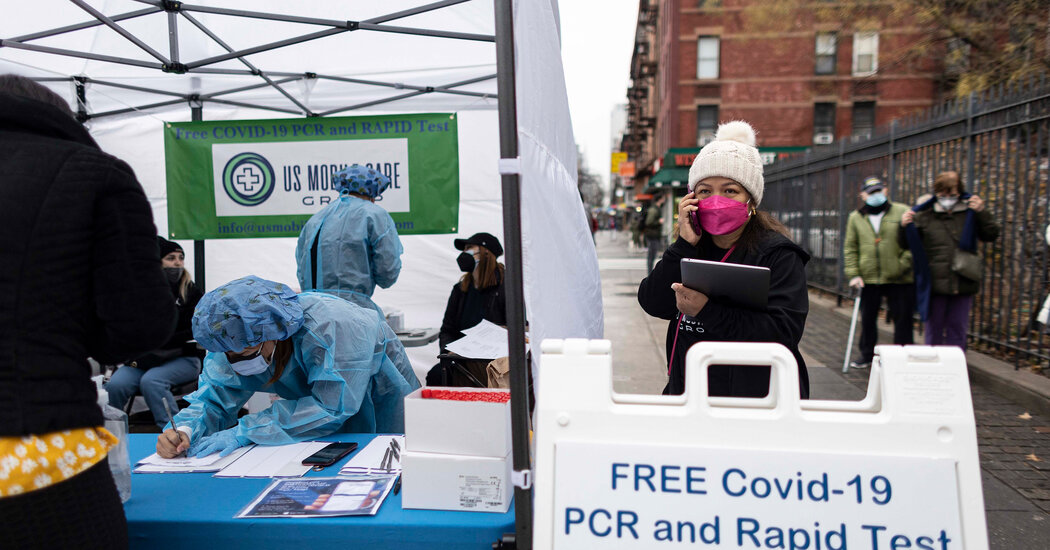After losing her sister to the disease, Jona Tajonera wanted to help others. Now, she operates up to 20 testing sites across the city.
In April 2020, Jona Tajonera lost her big sister, Gina Tajonera, who was 56, to Covid.
By that May, she had started U.S. Mobile Care Group, a company that operates free mobile testing sites on the streets of New York. “This is my way of handling my anxiety,” said Ms. Tajonera, who has a background in health care administration. “It makes me feel better that I can help people because I wasn’t able to help her.”
Every day she and her team members administer around 400 tests at up to 20 sites, consisting of vans and tents, across the city. She personally swabs noses in the Hell’s Kitchen neighborhood of Manhattan.
“The lines don’t make me nervous anymore,” she said. “Sometimes I even feel like a superstar, because people are so excited when I show up with tests,” she continued. The nerve-racking part is when she has to deliver the news, in person, of a positive result from a rapid test. “They are frustrated, they are angry, they yell at me,” she said.
“I had one woman yesterday who was on her way to the airport to fly to Spain. She had her luggage with her. She was crying. That made me stressed; I hated telling her she couldn’t take her flight.”
Ms. Tajonera, 52, lives in Bay Ridge, Brooklyn, with her mother, Lerma Tajonera, 81, and her sons, Joshua Bailey, 24, and Jason Bailey, 19.
HEALTH FIRST I wake up between 6 and 6:30 every morning. The first thing I do is prepare food for my mom to eat during the day. She is diabetic, so I try to make her fish, vegetables, fruit, things like that. I don’t know what happens when I turn my back and leave for work though. My mom has a caretaker, and I think my mom intimidates her, so she’ll sneak her rice. We are Filipino, so we love rice from morning to evening. But rice is a carb; it turns to sugar, and that is not good for her.
TENT EXPANSIONS We’ve been opening up new testing sites, and the other day we put up a tent right outside of my house in Bay Ridge. It takes about 30 minutes to set up. We put up the tent, the table and the chairs. We have to make sure we have everything we need: tubes, swab kits, sanitizer, gloves, tissues, registration forms and the certificates we fill in saying if someone is positive or negative. An important item we can’t forget is the red container for the used rapid tests; they are considered a biohazard.
PRECIOUS CARGO The rapid tests get delivered to my home, and then I bring them to the sites. It’s very complicated to get them. You get a certificate and number from the Department of Health, and then you can use that number once a week to buy them.
PERFORMANCE ANXIETY All of our tests are free to the public, but we also have some private clients who we do testing for, like the Metropolitan Opera. We test the singers before they do a recording or have concerts. This week we did rapid tests for them every day and a single PCR test. They are nervous because one day one of their singers tested positive after they had been rehearsing, so they want to make sure they catch it early next time.
GRAB AND GO These days there is no time to eat. I’ll usually have something easy like a chicken sandwich while I’m driving. The other day all I had was a croissant. Even when I get home, sometimes all I’ve had is an almond bar from Starbucks. Food and sleep are not my friends right now; sometimes we forget each other.
The Coronavirus Pandemic: Key Things to Know
The global surge. The coronavirus is spreading faster than ever, but it appears that Omicron is milder than previous variants. Still, the latest surge in cases is causing hospitalizations in the U.S. to rise and lifesaving treatments to be rationed.
NO REST FOR THE WEARY We finish testing around 5, and I get home by 6. Often, I still have friends texting me that they couldn’t find a testing site and asking if I could test them. I’m like, “Oh my God, I just need a shower.” I did tell one friend who had an exposure she could come over at 7, and I tested her. She was negative.
PAPERWORK For all the people who tested positive I have to report it to the Department of Health. We have a spreadsheet from all of the sites, so I send the information over to them so they can start contact tracing. I love doing the reports because I love statistics. I like to look at what vaccine everyone had. The Moderna people seem to have the fewest symptoms.
MAKING THE CALLS Me and my team split up the people we need to call who tested positive with a PCR test. Yesterday I had 16 patients to call, and some of them give you their whole life story. One guy said he needed to have sex with his wife because it had been so long, and he doesn’t know what he is going to do now. If patients feel depressed, we schedule a follow-up appointment with them and a nurse practitioner. There are a lot of people who say, “Thank you for your service” or tell me how hard it was for them to find a place to get tested. These comments make me want to do this again and again.
NO NEED FOR SLEEP AIDS Before Omicron I would have a glass or two of wine before going to bed because it makes me sleep well. Now I don’t need that; as soon as I hit the pillow I am sound asleep.































